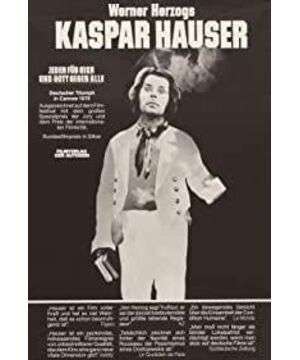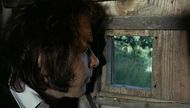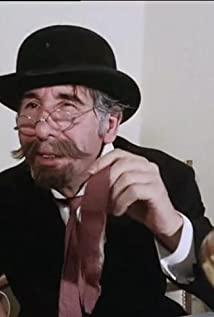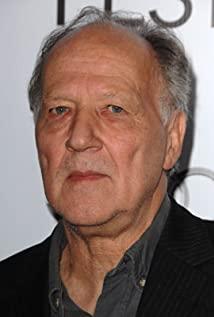The Greek philosopher Aristotle once mentioned in his book "Politics": "In essence, man is a social animal; those individuals who are born to live in isolation are either not worthy of our attention, or are not human. Society is inherently prior to the individual. Those who cannot live a communal life, or can be self-sufficient without a communal life, and therefore do not participate in society, are either beasts or God.”
In 1975, the famous West German director Herzog portrayed the protagonist Kaspar in The Mystery of Kaspar Hauser, who was imprisoned in a four-walled basement since childhood. It is not until after adulthood that they first come into contact with human society. When Kaspar has not yet learned to walk upright and acquire language, he is no different from a beast, but his temperament is more docile than that of a beast. When he mastered the language to express his inner desires and write personal biographies, he truly acquired the ability to understand human society, but it did not mean that he became a human being recognized by mainstream society. What is peculiar about him is that he lacks the historical experience disciplined by the existing religion, folklore, culture and ideology in the society, and he often pops out some questions about human society from his lips, causing the well-read civilized people in the society to be dumb. Speechless.
The creation of such a spectacle-like character by director Herzog is actually hidden behind the core appeal of the narrative strategy. unique cognitive perspective. In addition to daring challenges to social civilization norms, the director also observes the lives of marginalized groups and low-level peasants with a caring eye, in order to ridicule the prevalent discrimination, hypocrisy and short-sightedness in aristocratic society.
In the author's opinion, Kaspar Hauser's brief descent into human society is actually a process of anti-socialization carefully planned by the director. Next, this article will sort out and show the thought-provoking process in detail. place.
Walking upright is one of the hallmarks of being human
At first, when Kaspar was imprisoned in the basement, a chain was attached to his back and his body was artificially bound to the ground. Since his feet were never used to support his body, the muscles in his limbs were too weak to stand or even sit upright independently. In order to be able to integrate into human society, the first thing is to become an individual who can walk upright independently. The second is to wear a set of clothes and shoes that conform to their class status and accept the scrutiny and scrutiny of others.
Is language a tool for expressing or limiting the mind?
When Kaspar first came into contact with writing, he wrote his name under his father's professor. Among them, it is worth reflecting on the discipline and discipline involved in the education process. When Kaspar was distracted by the wooden horse toy, his father hit him hard with a stick on his frail, fair arm, leaving a scar that became a sign of physical discipline. Michel Foucault mentioned in "Discipline and Punishment": "Discipline is a special power technology produced in modern times, which is not only a technology for power to intervene, train and monitor the body, but also a means to create knowledge." Caspar has been shrouded in the power of his father since childhood and lost his most basic right to personal freedom. When his father decided to let him into human society, he relied on coercive orders and brute force to urge him to acquire the language and actions normalized by human society.
It was in a farmer's house that Kaspar really began to master the language ability of his mouth, from a single word to a poem in a nursery rhyme, and gradually understood the meaning of a long daily sentence.
As one of the tools of human self-expression, language conveys the wishes and emotions of the soul. When Kaspar took the initiative to escape from the cage of the circus, it not only symbolized his personal will to yearn for freedom and his determination to refuse to be enslaved, but also expressed his strong desire for the first time in the peak house: "I imagine a rider Fly like that, and fight in war."
From another perspective, language is also a standardized way of expression. Based on the purpose of communication, human beings can only choose fixed vocabulary and sentence patterns to convey their emotions and thoughts. However, human beings still cannot fully understand themselves and the world. There are a lot of unknown things waiting to be defined and explained, so is there also a dislocation and limitation between language and human thought? Just as Kaspar encountered difficulties in writing his biography, perhaps it was the lack of vocabulary that made it difficult for him to dig into himself in detail, or perhaps there was an existing gap between thought and language.
A worldview towards equality
Due to Kaspar's docile temperament, kind-hearted nature, and lack of historical experience of what the human world looks like, in his vision, objective things have their own will, animals are personified, men and women should be equal, and civilized people There should be no discrimination against savages.
For example, in the film, Kaspar once lifted the cat's hands to help it walk upright, and called the red-crowned crane who had accidentally entered his garden "someone broke in"; and Kaspar and two scientific researchers argued that the apple stopped in Whether or not the location is determined by humans.
And Kaspar's question about the status of women in the family has more practical significance. The background of the story in the film is located in West Germany in the early 19th century, and at the same time liberalism began to prevail in various countries in Western Europe. For individuals, individual freedom and autonomy are the core of the concept of life, and the state and society should take it as the construction goal. The school of thought of liberal feminism was born on the basis of liberalism, advocating that housewives get rid of the shackles of family affairs and pursue equal work opportunities and social status with men. Although Pascal did not have the same personal experience as women, he found that the activities of housewives were almost limited to the vicinity of the family, and their labors were almost revolved around housework. The bondage of women is no less than the painful experience of his captivity.
The mystery of Kaspar's life attracted an aristocrat from England and was invited to a grand banquet of the aristocracy. At the banquet, Kaspar looked cramped and nervous, and the words of a young lady in the crowd exposed the desecration of civilization and discrimination against the bottom of the aristocratic society: "He is like a well-dressed barbarian. ." No matter how solemn and gorgeous clothing and elegant cultural taste, they can't hide their mean and ugly humanity.
European civilization and barbarism have always appeared at the same time. On the one hand, it is the development of the most revolutionary science and technology, literature, music, and art philosophy. human life. Today, the real barbarians may not be the uncivilized people in the ancient jungle law, but the so-called civilized people who try to use civilization as a fig leaf for ugly humanity.
limitations of science
Since Kaspar entered human society, a researcher has always recorded Kaspar's behavioral characteristics and thought patterns that are different from ordinary people. It was not until after Kaspar's death that he took out Kaspar's brain in the human dissection room and used biological methods to prove that Kaspar's brain was deformed, which led to his so-called scientific conclusion. .
Director Herzog used this part as the end of the film, satirizing the disciplinary system that relies on sophisticated instruments and norms, or directly pointed to the limitations of biology in the methods and thinking of human beings.
There have been many religious ideological and theoretical systems that understand human beings and the world in human civilization. The pursuit of truth has always been an infinite driving force for human beings to explore mysteries. However, what we see is the emergence of a certain authority as the only way to recognize the objective object. The appearance of authority makes thought disciplined, and it also leads to human arrogance, discrimination and prejudice.
Director Herzog ends with a poetic and open allegory as a response to his worldview.
In this composition, Kaspar is lying on the bed as the center of vision, and everyone around is watching him, except for the blind man by the piano stand who faces out the window. Later, Kaspar also tells the story of a blind man leading a team of explorers to successfully cross the desert danger.
Perhaps only when human beings no longer establish authority for thought and allow multiple views of objective things, can human beings see the truth like the only blind man who looks out the window.
View more about The Enigma of Kaspar Hauser reviews









